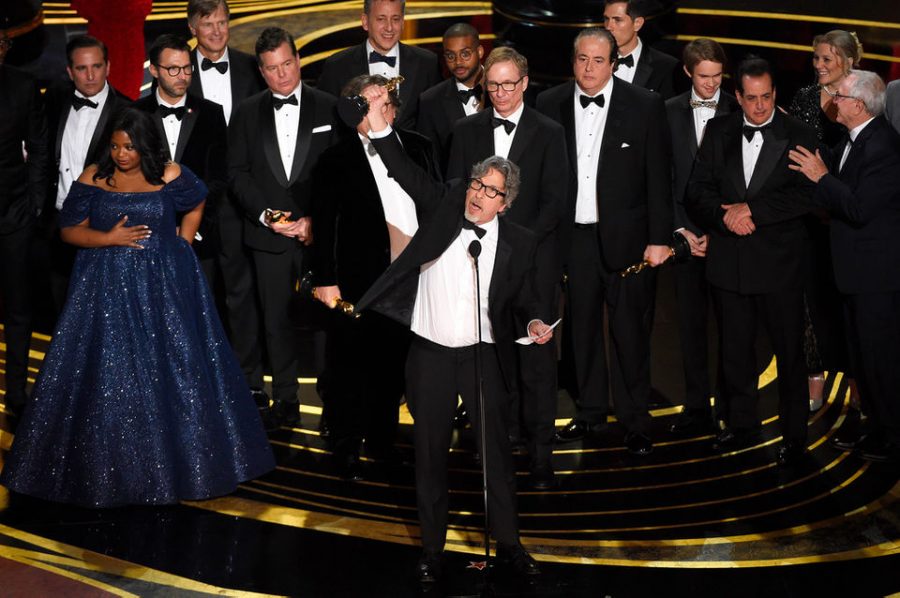2019 Oscars prove the Academy has taken one step forward and two steps back
What the hell just happened?
That’s what many people were surely thinking after the 91st annual Academy Awards, which aired this past Sunday, Feb. 24. Already thought to be one of the most unpredictable ceremonies in the show’s history, this year’s results completely subverted audience expectations, creating one of the most controversial Oscars in years.
Perhaps the most surprising outcome came in the form of Best Picture. In a shocking twist, the night’s most coveted honor — largely expected to go to Netflix film “Roma” — went to “Green Book,” one of this year’s most polarizing nominees. Several audience members, including Spike Lee and Jordan Peele, reportedly refused to applaud the film’s victory. Lee, whose film “BlacKkKlansman” was also nominated for Best Picture, was visibly upset and later told reporters “the ref made a bad call” in reference to “Green Book’s” win.
The film’s unexpected victory became more problematic when its director, Peter Farrelly, repeatedly credited the film’s success to star Viggo Mortensen during their acceptance speech. Meanwhile, co-stars Mahershala Ali — who won Best Supporting Actor for his role in the film — and Linda Cardellini were only briefly mentioned. Executive producer Octavia Spencer was not thanked at all. Neither was Dr. Don Shirley, the real-life inspiration for the film. Normally, this wouldn’t be an issue. But for a film all about racism — particularly one that’s already been criticized for perpetuating the white savior complex — slighting the black people that made it happen in favor of its white star wasn’t exactly going to earn it any brownie points.
And while Lee may have been rightfully critical of the Academy’s choice for Best Picture, he didn’t walk away empty-handed. After an infamous Best Picture snub for his film “Do the Right Thing” in 1990, he finally won an Oscar for Best Adapted Screenplay. And in typical Spike Lee fashion, he used his acceptance speech to make a powerful call to action — much to President Donald Trump’s disdain.
“The 2020 presidential election is around the corner,” Lee said. “Let’s all mobilize. Let’s all be on the right side of history. Make the moral choice between love versus hate. Let’s do the right thing.”
Meanwhile, “Black Panther” made Oscar history after costume designer Ruth Carter and production designer Hannah Beachler became the first black winners in their respective categories.
And “Roma,” in spite of its Best Picture snub, still made waves, taking home the awards for Best Cinematography, Best Foreign Language Film and Best Director. During his acceptance speech for the latter, writer-director Alfonso Cuarón acknowledged the significance of the film’s victory for representation in film.
“I want to thank the Academy for recognizing a film centered around an indigenous woman,” he said. “A character that, historically, has relegated in the backgrounds in cinema.”
“Bohemian Rhapsody” star Rami Malek also made history as the first person of Arab heritage to win Best Actor. After noting that he is a first-generation American and the son of Egyptian immigrants, Malek used his acceptance speech as a platform to celebrate diversity and reach out to those struggling with their own identities.
“We made a film about a gay man, an immigrant, who lived his life just unapologetically himself,” he said. “And the fact that I’m celebrating him and this story with you tonight is proof that we’re longing for stories like this.”
The combined forces of Malek, Ali and “If Beale Street Could Talk” star Regina King marked another milestone accomplishment. Their respective victories for Best Actor, Supporting Actor and Supporting Actress made this year’s ceremony the first time the majority of the acting categories were awarded to people of color.
It was also another huge night for women. The battle for Best Actress was largely predicted to be between Glenn Close for “The Wife” and Lady Gaga for “A Star Is Born,” with the former a six-time nominee (with no wins) and the latter a first-time acting nominee. (Gaga had previously been nominated for Best Original Song in 2016.) Though Close was predicted to have a slight edge, in a stunning turn of events, she lost her seventh Oscar nomination to “The Favourite” star Olivia Colman.
“Glenn Close, you’ve been my idol for so long, and this is not how I wanted it to be,” a clearly flabbergasted Colman said during her hilarious acceptance speech. “I think you’re amazing, and I love you very much.”
Gaga, meanwhile, snagged the award for Best Original Song for “Shallow.” Prior to winning, she triumphantly took the stage with “A Star Is Born” co-star Bradley Cooper to perform the song live for the first time on television.
And to think all this happened without a host. After this year’s Oscars host controversy, it was a surprisingly refreshing change to not have one person as the anchor of the evening. (Tina Fey, Amy Poehler and Maya Rudolph, however, reminded us that they would be amazing Oscars hosts, for future reference.)
All in all, the Academy made some bold decisions this year, most of which should be commended. Progress is being made, but the risk they took with “Green Book’s” upset victory in Best Picture proves we still have a long way to go.
And while I thoroughly enjoyed this year’s program, after the emotional rollercoaster that was the 2019 awards season, all I can think is, “Thank God it’s over.”












